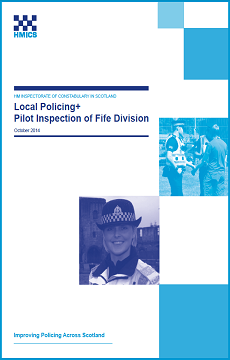This inspection, which forms part of our published scrutiny programme, was conducted as a pilot to test our methodology of the Local Policing+ inspection programme, whilst at the same time undertaking a robust evidence-led inspection of Fife Division. The learning from the pilot will inform our rolling programme of divisional inspections that aim to assess the state, effectiveness and efficiency of Local Policing across Scotland.
Effective local policing is fundamental to the success of Scottish policing. It is the part of policing that interacts with the public on a daily basis and is essential in building good relations with persons, localities and communities in Scotland. Positive local relationships strengthen the legitimacy of Police Scotland to carry out its function and support communities to improve their safety and wellbeing. Effective local scrutiny and engagement are also essential to the success of policing, through the identification and agreement of local priorities and holding the local commander to account for their delivery.
Localism has been reflected within the three identified aims of Police Reform, namely:
(i) to protect and improve local services,
(ii) to create more equal access to specialist support and national capacity and
(iii) to strengthen the connection between services and communities.
We have therefore taken the opportunity during this inspection to comment on the extent to which these reform objectives are being achieved.
Number | Recommendation |
|---|---|
1 | Police Scotland should work collaboratively with local authorities and community planning partners to identify what public survey data is needed to support local policing and community planning outcomes and agree what should be provided nationally and locally. |
2 | Police Scotland should reconsider the national requirement for Multi-Member Ward Plans for 2015-16 and empower local commanders and local scrutiny groups to develop sublocal policing plans that better reflect localities, partnership service delivery and support place based approaches. |
3 | Police Scotland should ensure that its methods of data collection are sufficiently flexible to provide a range of information that meets the requirements of local plans, sub-local plans and supports place based approaches. |
4 | Police Scotland should consider ways to involve local authorities and community planning partners in the identification of key measures for the agreed priorities within local policing plans and single outcome agreements and should regularly update communities on their delivery through effective local public performance reporting. |
5 | The Divisional Commander should introduce a debriefing process to gather intelligence and capture the outcomes from OSD resources when deployed in Fife division. This should be used to inform an assessment of the effectiveness of the OSD activity and its contribution to local priorities. |
6 | The Divisional Commander should monitor divisional practices in relation to the cancellation of rest days and the management of Time Off In Lieu (TOIL) and annual leave across Fife. |
7 | Police Scotland should review internal engagement processes to ensure that key messages are understood by officers and staff and that they are able to raise issues for discussion, receive feedback on the outcomes, and have the opportunity to participate in change. |
8 | The Divisional Commander should complete the review of local policing structures in Fife as quickly as possible and should take account of the views of officers, staff and stakeholders. |


